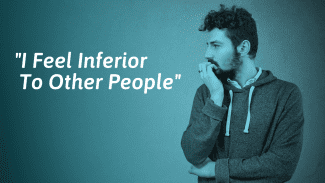Have you ever had thoughts like these:
- “People will think [insert negative thing] about me”
- “No matter what advice I get, there’s just… something in me that’s not enough”
- “I don’t feel important enough to people”
- “Everything would be better if I just had the right looks”
What we really want is to just stop caring what others think of us. Why is that so hard?
There are thousands of self-help books promising to help, and I’ve read a lot of them. 90% of the advice is terrible.
Luckily, there’s been a lot of research the recent years on what ACTUALLY works to increase your self-esteem.
Just had the most interesting talk with Viktor Sander. He’s the guy making sure everything you read on SocialSelf is scientifically based and not just some random guy’s opinion.

He has a B. Sc. in Behavioral Science (University of Gothenburg). Basically, you could say that he’s good at understanding how people actually work.
Today I’m going to summarize what Viktor said when we talked about self-esteem. He told me some pretty mind-blowing things.
Let’s cut right to the chase.
We often feel like we’re unique and that advice might work for others, but not for us.
In reality, most of those thoughts aren’t very unique at all:
- Fearing that people will realize that you’re a fraud (There’s even a name for that feeling: The Impostor syndrome)
- Assuming we’re not important enough to others
- Feeling like everyone pays attention to us and will notice how weird we are (Called the Spotlight effect)
- Feeling like people laugh at us behind our backs
- Getting nervous talking to people with high social value/ attractive people / tall people
- Having a general feeling of being less worthy than others
- Thinking that there’s something wrong with us that makes us unable to learn, for example, learn to be more socially skilled
- Feeling like a stranger, like you don’t belong
- Thinking that being more good-looking would solve everything
- Assuming others just won’t like us
- Not trusting people
It feels like we are the only ones who think stuff like this because few like to admit that they think the same way.
What’s generally true is that as our self-esteem improves, we care less and less about these thoughts.
A good self-esteem is wonderful to have. It’s nice to know you can go to a party and just feel at ease being there. And it’s great to not be self-conscious all the time and just be able to enjoy the moment.
So, how do you increase your self-esteem?
One piece of advice that we hear all the time is using “positive affirmations”. You know, putting post-its on the bathroom mirror and repeating to yourself that “I’m good, I’m lovable”.
But when scientists studied positive affirmations, they discovered something surprising. Yes, affirmations can work for people with good self-esteem. But for people with low self-esteem (those who need it), affirmations will actually make them feel WORSE about themselves. Because their inner voice replies “No you’re not, no you’re not”)
What actually works is being okay with NOT being great all the time.
So instead of telling yourself things like “I’m the best, I’m the best” you can say “I’m probably not the best, but that’s OK”. This method is called “Self-compassion”.
But this is actually still not the most powerful way to boost your self-esteem.
Self-esteem is quite hard to change sitting at home trying to make yourself believe different things.
The most powerful way to increase your self-esteem is to actually improve something in your life. Just setting up small, reachable goals and then achieving them is an extremely powerful way to make us feel better about ourselves. (Study 1, Study 2)
For example, if you improve your social life, that will in itself make you feel better about yourself. It makes you feel capable.
Personally, I never did any specific “self-esteem exercises” – I just improved my social life with very hands-on methods, like the ones I teach at SocialSelf. Thanks to the improvements, people want to hang out with me more.
When people tell you that they love to hang out with you, that makes your self-esteem skyrocket.
Just knowing that you have a close set of friends will boost your self-esteem, too.
That’ll help release the pressure from social interaction:
You can be yourself, you can mess up, you can experiment and you can say what you want to say. You might make someone dislike you and it’s not a big deal. Rejection isn’t bad when you have really good friends to fall back on.
That safety will make you feel more at ease, and it’ll help you enjoy life more in general.



I want to develop my communication skill and way of talking. So which steps I can take?